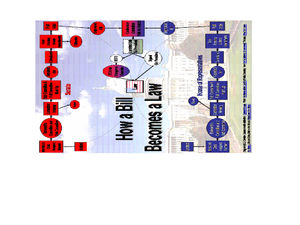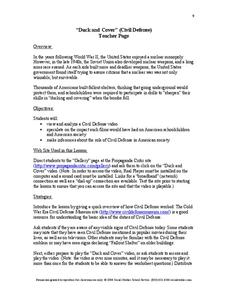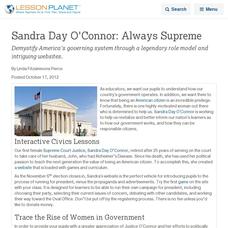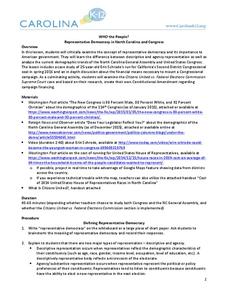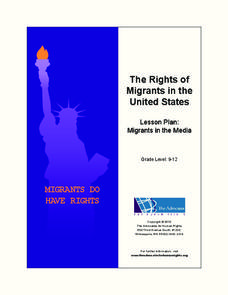Media Smarts
Making Media for Democratic Citizenship
Pupils analyze global issues. In this video podcasting lesson plan, pupils research Internet and print sources regarding selected global development issues. Pupils plan and create video podcasts that feature their research findings.
Curated OER
3 Branches of Governement
Sixth graders use the "Making the Grade" books, citizenship packets, and the "Ben's Guide" website to create a poster and a report on their assigned government branch. They then present their poster and report to their classmates.
Curated OER
Government Lesson Plan 17
Students analyze evidence of society's socioeconomic goals, prioritize goals, and identify the opportunity costs of limited government funding.
Curated OER
Government & Politics
In this United States history worksheet, students reference their textbook to answer 16 fill in the blank questions and 8 short answer questions regarding the early government of the nation.
Curated OER
Judicial Review
Student demonstrate understanding of both sides of the argument between Jefferson and Marshall that led to the strengthening of the Judicial Branch through the creation of judicial review. Unit is comprised of five lessons and fits into...
Curated OER
The U.S. Constitution Power Grab Game
Young scholars study the powers and limitations of the three branches of the American government. They explain how the system of "checks and balances" protects the individual citizens. They explain how the amendments to the Constitution...
Curated OER
Class Rules (Responsible Personal Conduct)
Students consider the necessity of rules. In this citizenship lesson, students consider the reasons for rules as they are introduced to their classroom rules and procedures.
Curated OER
Government Lesson Plan: Lesson Plan 5
High schoolers identify the process of writing a case brief. They analyze the case McCulloch v Maryland. After a lecture/demo, students utilize a case study worksheet imbedded in this plan to help them explain the process of performing a...
Curated OER
I Want to be an American Citizen
Students create a web page after researching what prospective US citizens need to study to for citizenship. They practice using a web page editor program.
Curated OER
What Is the Role of the President in the American Constitutional Government?
Students read about the role of the president. In this US government lesson plan, students read about the role of the president as stated in the US Constitution. Students examine issues of presidential power and identify various checks...
Curated OER
How Government Works and the Rights of the People
Eighth graders identify how to be responsible citizens. In this civics lesson, 8th graders review websites of congressional members and then create questionnaires about the responsibilities of citizens.
School Improvement in Maryland
Analysis of Marbury v. Madison
Should the United States Supreme Court have the power of judicial review? Instructors guide class members through a review of Marbury v. Madison and assist class members in writing a brief of the case. As independent practice,...
Social Studies School Service
“Duck and Cover” (Civil Defense)
Bert the Turtle models for viewers the 1950s Civil Defense Duck and Cover strategy that was supposed to protect citizens from a nuclear blast. After viewing the video, watchers are asked to consider the motivations of the producers of...
Curated OER
We the People…in the News
Students use the newspaper to explore the world around us, our past and our government. In this civics unit, students complete 40 different lessons in civic education using that day's newspaper to reinforce the concept being taught.
Close Up Foundation
Rights Auction
In an engaging activity on universal and unalienable rights, learners work in groups to establish a democratic nation and determine what principles they want to protect to ensure a democratic society. They conduct a "rights auction" in...
Nikola Tesla documentary student worksheet
PBS documentary: Tesla - Master of Lightning; this worksheet will keep the students engaged while watching this excellent documentary about Tesla. The documentary can be found on Netflix or YouTube. It will take two class periods to...
Curated OER
Picture Books and the Bill of Rights
Students identify the basic freedoms of citizens in the United States. In this Bill of Rights lesson, students act out scenarios about the Bill of Rights. Students create a picture book describing the rights they've acted out.
Constitutional Rights Foundation
Winner-Take-All: The Two-Party System
Two's company, three's a crowd. High school historians learn about the Electoral College, a two-party, winner-take-all voting system in the United States. The lesson explains the pros and cons of the two-party system, roadblocks for...
Curated OER
Kindergarten Here I Come: Rules
Designed to thoroughly reinforce your classrooms' rules with young learners, this lesson makes several suggestions for instructional procedures to accomplish this goal. For example, repeated questioning and procedures as well as...
Curated OER
Sandra Day O'Connor: Always Supreme
Demystify America's governing system through a legendary role model and a fabulous website.
Carolina K-12
Who the People? Representative Democracy in North Carolina and Congress
Our elected officials are supposed to represent us, but what does it mean when they aren't like us? Budding citizens explore the demographic makeup of the US Congress, the role of money in political elections, and the Citizens United...
ProCon
Illegal Immigration
Should immigrants who illegally reside in the United States be eligible for citizenship? With information about undocumented immigrant population estimates, sanctuary cities, and unaccompanied immigrant children, pupils consider the pros...
Advocates for Human Rights
Migrants in the Media
Class members examine two documents—The Universal Declaration of Human Rights and The Rights of Migrants in the United States—and then use reports in the media to assess how well the US is doing in ensuring these rights.
Roy Rosenzweig Center for History and New Media
The Homestead Act
To understand how the Homestead Act of 1862 changed the US and the lives of the people during that time, class members examine primary source materials including letters, broadsides, and images. They then assume the voice of a...












